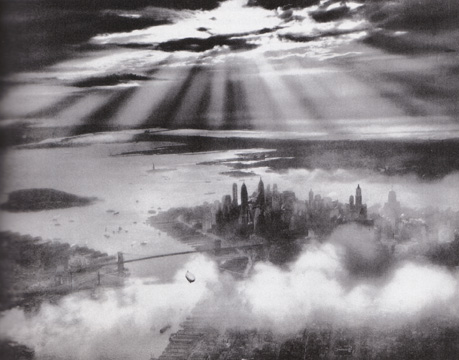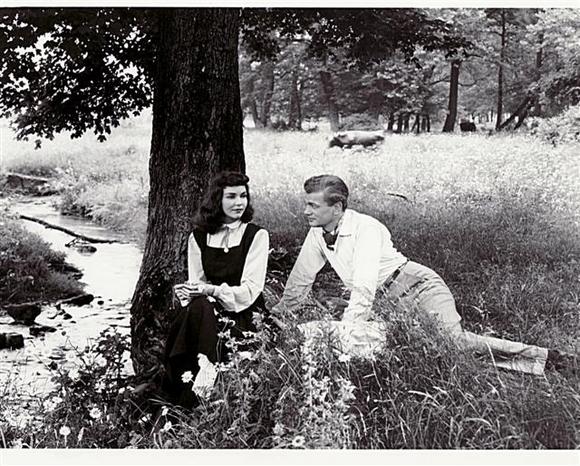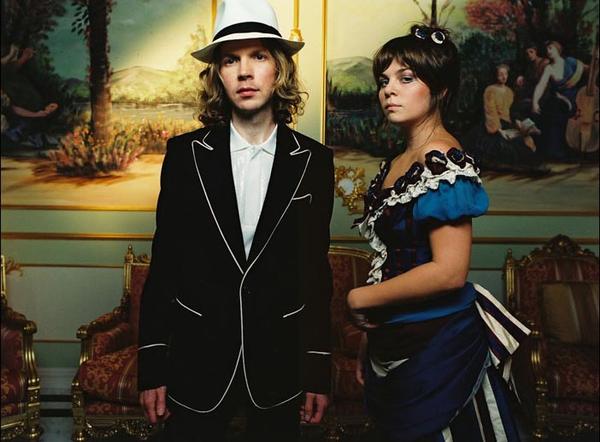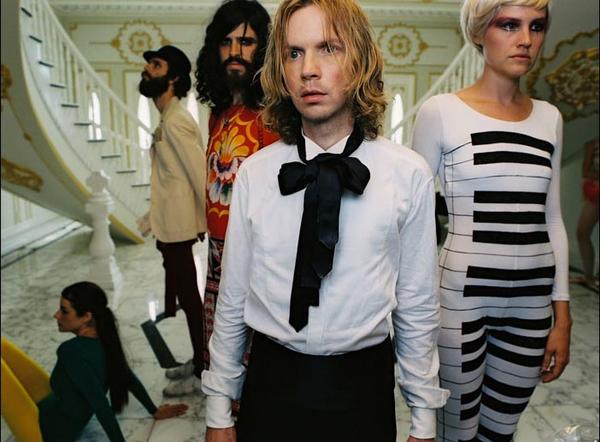 FILM
FILM In Which Orson Welles Regards The Magnificent Ambersons
 Tuesday, August 16, 2011 at 11:29AM
Tuesday, August 16, 2011 at 11:29AM 
The Golden World
The ideal American type is perfectly expressed by the Protestant, individualist, anti-conformist, and this is the type that is in the process of disappearing. In reality there are few left.
Films destroyed by Hollywood executives form a rich genre on their own terms. Of all Orson Welles' films, none suffered more at the hands of his "betters" than 1942's The Magnificent Ambersons. Merely viewing a scene from the version that eventually made it to theaters was enough to reduce Welles to tears all his life. Welles' true vision of The Magnificent Ambersons, his adaptation of Booth Tarkington's novel, is lost to history, but even in the chopped-up version created while he filmed another legendary debacle in Rio would dazzle audiences. Peter Bogdanovich works his way to asking Orson what happened to Ambersons.

PB: What happened with War and Peace?
OW:: That was my first nonpicture for Alex. We were going to shoot in in the Soviet Union. They were ready to give us just about everything — the whole Red Army for the retreat from Moscow. The same kind of sky's-the-limit backing they gave Bondarchuk later. As for Alex, he was going to deliver Viven Leigh, Larry Olivier, Robert Donat, Ralph Richardson, old Uncle Tom Cobbley, and me.
PB: You were going to play Pierre.
OW: It's my part.
PB: You wrote a script?
OW: Yes, which is no mean job for somebody like myself who can't figure out the diminutives on Russian names.
PB: Why did it collapse?
OW: The Cold War killed us off. And MGM and Alex came to a parting of the ways.
PB: Where are all these scripts?
OW: I only keep 'em as long as I think there's some kind of chance for them. Most of 'em, of course, burned up in Spain.
PB: You were also going to do Crime and Punishment at one point...
OW: Not for Alex, but yes, I got a kind of offer, and nothing happened. I don't think I would have done it well. There are lots better Doestoevsky men than me. My Russian writers are Tolstoy and Turgenev, Gogol and Chekhov.

PB: Francois Truffaut once said that if Flaubert reread Quixote every year, why can't we see The Magnificent Ambersons whenever possible. Did you ever hear that quote?
OW: No. Thank you for passing it along.
PB: Tim Holt's character, who represents the dying plutocracy, is quite unpleasant; and Eugene (Joseph Cotten) , the representative of the mercantile age, it's very attractive.
OW: Well, just because he's bringing with him the whole stinking hell of the automobile age doesn't mean he isn't a nice human being. He admits himself that what's he's doing may be a bad thing. My father felt that way about it. He was a motorcar pioneer, but he abandoned it early on.
PB: For what reason?
OW: Got tired of it, I guess. Then he invented a bicycle lamp which, as it turned out, was on practically every automobile in the world! He was a friend of Tarkington's, and really there's a lot of my father in that character. An early automobile fellow with a deep suspicion of what they automobile would do — fascinated by it, and very much afraid of what it was going to do to the world. Cotten played the role quite marvelously, I think.
PB: For his big speech in the dinner scene, did you give him that piece of business — playing with the spoon as he talks?
OW: I wonder. I rather think it was probably his. Those kind of things usually come from actors.
PB: You know, it wasn't until about the fourth or fifth time I saw the picture that I saw any social points.
OW: One shouldn't ever be conscious of the author as lecturer. When social or moral points are too heavily stressed, I always get uncomfortable.
PB: Well, in Ambersons, the social observation is so integral to the story of the people that it never intrudes.
OW: Had to be careful about that. The only points I don't mind really stressing are ones that deal with character.

PB: The influence of radio is very apparent in Ambersons.
OW: The narration, you mean? I'd like to do more of it in movies.
PB: Using a narrator who is not a participant?
OW: Yes, who just comes out and tells the story. I like that very much.
PB: Aren't you doing that with Don Quixote?
OW: Sort of, yes.
PB: It's supposedly uncinematic.
OW: I think words are terribly important in talking pictures.
PB: The script for Ambersons is one of the tightest ever written. For instance, the prologue establishes all the characters in three or four situations, sets up the period and the customs of the era, all within the first few minutes.
OW: I don't like to dwell on things. It's one of the reasons I'm so bored with Antonioni — that belief that, because a shot is good, it's going to get better if you keep looking at it. He gives you a full shot of somebody walking down a road. And you think, "Well, he's not going to carry that woman all the way up that road." But he does. And then she leaves and you go on looking at the road after she's gone.
PB: You wrote the script for Ambersons alone?
OW: Yes. Quite a lot of it on King Vidor's yacht off Catalina. And the rest of it in Mexico. With Molly Kent, the script girl from Kane, doing the secretarial work on it — best script girl that ever existed. Then we rehearsed it — longer than I've ever rehearsed anything in movies. It was a relatively small cast, and everybody worked very hard. I think we were five weeks — not on the set or anything, no movements, just rehearsing. And then we recorded every scene, for reference, so we could listen to the way we'd decided that it ought to sound like — even if we were going to change our minds, you know, later.
PB: Does it save time?
OW: It should have, but our cameraman was so slow that we took longer to shoot than any picture I've ever done.
PB: The opening prologue has a slightly mocking tone mixed with nostalgia.
OW: I think we tend to look back on the immediate past — the past that isn't history but still a dim memory — as being faintly comic. It's an American attitude. I remember my own parents looking at old pictures of themselves and laughing.
 Anne Baxter & Tim Holt as George and Lucy
Anne Baxter & Tim Holt as George and Lucy
PB: Why did you make fun of men's clothes and not women's?
OW: Because the men's clothes were funny and the women's weren't. The women's clothes were beautiful.
PB: Did you have to study that period, or was it second nature to you?
OW: It was a real one for my father and mother — and I was only that step away from it. It was much easier to do that period, because you could find the props and costumes for it in storage. It's very much harder to make an eighteenth-century movie, because the clothes and furniture and the wigs aren't ever really right.
PB: The staircase seems to dominate one's memory of Ambersons.
OW: Well, the heart of a pompous house was its pompous staircase. It's all that imitation-palace business. These people haven't got any royal processions to make, but they wouldn't admit it. I had great aunts were lived in houses exactly like that one. There was one house that had a ballroom on the top floor, just like the Ambersons'.
PB: The top floor?
OW: The third floor, not the attic. And at some stage somebody changed it into an indoor golf course — some second husband, I guess. I remember those terrible green felt hills built all over the old ballroom.
PB: I read a newspaper interview with Jo Cotten recently in which he said you'd been planning to shoot a new ending to Ambersons, since the old one was destroyed.
OW: Yes, I had an outside chance to finish it again just a couple of years ago, but I couldn't swing it. The fellow who was going to buy the film for me disappeared from view. The idea was to take the actors who are still alive now — Cotten, Baxter, Moorehead, Holt — and do quite a new end to the movie, twenty years after. Maybe that way we could have got a new release and a large audience to see it for the first time.
OW: You see, the basic intention was to portray a golden world — almost one of memory — and then show what it turns into. Having set up this dream town of the "good old days," the whole point was to show the automobile wrecking it — not only the family but the town. All this is out. What's left is only the first six reels. Then there's a kind of arbitrary bringing back down the curtain by a series of clumsy, quick devices. The bad, black world was supposed to be too much for people. My whole third act is lost because of all the hysterical tinkering that went on. And it was hysterical. Everybody they could find was cutting it....
PB: When did you record the narration?
OW: The night before I left for South America to begin It's All True. I went to the projection room at about four in the morning, did the whole thing, and then got on a plane and off to Rio — and the end of civilization as we know it....

When the first preview was held in Pomono, California, it followed a broad musical and the audience returned 72 negative comment cars out of 125. The cards posed questions such as, "Did you like this picture?" Here were some of the answers:
Yes. This picture is magnificent. The direction, acting, photography, and special effects are the best the cinema has yet offered. It is unfortunate that the American public, as represented at this theatre, are unable to appreciate fine art. It might be, perhaps, criticized for being a bit too long....
No, the worst picture I ever saw.
...Too dramatic and strained but very artistic in spots...
I did not. People like to laff, not be bored to death.
Yes. Picture will not be received by the general audience because they as a whole are too darn ingorant....
I did not like it. I could not understand it. Too many plots.
No. A horrible distorted dream...
Yes, I liked it but I feel that it was above the audience. I think it was very depressing and nerve-racking, but still when I think about it in retrospect, I can see its good points.
It stinks.
The picture was a masterpiece with perfect photography, settings and acting. It seemed too deep for the average stupid person. I was disgusted with the way some people received this picture which truly brings art to the picture industry. Each artist is deserving of a great deal of praise.
Rubbish.
Exceedingly good picture. Photography rivaled that of superb Citizen Kane.... Too bad audience was so unappreciative.

Too many wierd camera shots. It should be shelved as it is a crime to take people's hard-earned money for such artistic trash as Mr. Welles would have us think... Mr. Welles had better go back to radio, I hope.
Too many shadows and the scenery was too dark.
No, it's as bad if not worse than Citizen Kane.
I think it was the best picture I have ever seen.
We do not need trouble pictures, especially now. Make pictures to make us forget, not remember.
Why do you like any good piece of art? A little hard to say in five lines, isn't it?

The film was cut to pieces by moronic executives after that, with Welles cabling from Rio to try to fix things. Even the star Joseph Cotten wrote him the following clueless letter:
March 28, 1942
Dear Orson:
In cases such as this great difference of opinion in the editing and cutting of Ambersons, people usually say "nothing personal, of course" as an excuse to say whatever they think. In my case, I have no business interest in Ambersons, Mercury or you; but a great personal feeling about all three, especially you, and whatever I say I know you will take in a personal way, and I want you to.
I have often been wrong in discussing scripts and plots with you, and I agree that I'm wanting in intellectual concept and understanding of art. I do, however, have a reliable instinct, and as often as I have been wrong about actual ideas, I have been right about audience reactions. I also know by now just about what your reaction to audiences is, and I am writing this to you because I know you would have been far from happy with the feeling in the theater during the showing last week. The moment the temporary title was flashed on the screen The Magnificent Ambersons, a Mercury production by Orson Welles, there was a wonderful murmur of happy anticipation, which was warming and delightful to hear and feel. And the first sound of your voice was greeted with applause. Certainly I was fair in assuming at this point that the audience was with us. Then something happened… it happened gradually and awfully and the feeling in that theater became disinterested, almost hostile and as cold as that ice-house they had just seen and my heart as heavy as the heart of Major Amberson who was playing wonderful scenes that nobody cared about.

You have written doubtless the most faithful adaptation any book has ever had, and when I had finished reading it I had the same feeling I had when I read the book. When you read it, I had that same reaction only stronger. The picture on the screen seems to mean something else. It is filled with some deep though vague psychological significance that I think you never meant it to have. Dramatically, it is like a play full of wonderful, strong second acts all coming down on the same curtain line, all proving the same tragic point. Then suddenly someone appears on the apron and says the play is over without there having been enacted a concluding third act. The emotional impact in the script seems to have lost itself somewhere in the cold visual beauty before us and at the end there is definitely a feeling of dissatisfaction… chiefly, I believe, because we have seen something that should have been no less that great. And it can be great, I'm sure of that. It's all there, in my opinion, with some transpositions, revisions and some points made clearer… points relating to human relations, I mean.
Our cables that fly back and forth I know present everything in a very unsatisfactory manner. They often must be misinterpreted at both ends. Jack, I know, is doing all he can. He is trying his best to get Bob Wise to you. His opinions about the cuts, right or wrong, I know are the results of sincere, thoughtful, harassed days, nights, Sundays, holidays. Nobody in the Mercury is trying in any way to take advantage of your absence. Nobody anywhere thinks you haven't made a wonderful, beautiful, inspiring picture. Everybody in the Mercury is on your side always. I miss you horribly and will be a happier soul when you return.
We all love you… and until then remain forever, as all of us do,
Obediently yours,
Jo

PB: Your ballroom sequence must have been rehearsed for a long time.
OW: It was a big job technically. But not as hard as you might think, because the sets were built for it. We didn't go into a set and them say, "Let's do these elaborate shots." We knew that this was going here and that wall was there — it was all planned before we started.
PB: Probably the silliest cut I know of comes in the middle of a long, sustained shot during the ball when two characters make some comment about olives, which were evidently new to America at the turn of the century.
OW: Yes. You didn't get to see the little joke about the olives because some lamebrain said, "What's olives got to do with it?" One of those things. They cut twenty seconds' playing time and cut into two pieces our crane shot that would have played for a whole reel without a cut. Too bad. I like digressions, don't you? Look at Gogol. Read the first dew pages of Dead Souls again and you'll see how one mad little digression can give reverberation and density to ordinary narrative.
PB: Perhaps the best things in your pictures are the digressions.
OW: Maybe that's why I've suffered so much from the cutters.
PB: Anyway, the olives cut killed your shot.
OW: Not stone dead, maybe, but it was kind of a shame to have worked that hard: four rooms with everything rolling back — an absolute triumph of technical engineering on everybody's part.

PB: Where did you shoot that snow sequence?
OW: All inside. The "ice house" — a refrigerated soundstage in downtown Los Angeles. Our snow scene in Kane was all shot on Stage 4 at RKO with cornflakes, and it worried me because you didn't see people's breath.
PB: Was the scene in which George and Lucy go through town on the horse and buggy originally intended to be done with rear projection?
OW: Never.
PB: Where on earth did you do it? It must be the longest dolly shot in the world.
OW: Just the old RKO back lot. We didn't build anything — just everything that was standing, redressed.
PB: It must have been half a reel, at least.
OW: Well, they just ride along.
PB: And the other side of the street is reflected in the windows.
OW: Yes, we used the reflections instead of trying to avoid them.
You can experience the history of Orson Welles on This Recording by clicking here.

"Little by Little (Shed remix)" - Radiohead (mp3)
"Codex (Ilium Sphere remix)" - Radiohead (mp3)
"Give Up The Ghost (Thriller Houseboat remix)" - Radiohead (mp3)

The Orson Welles Journey

Orson shoots Othello in Mogador...
Enjoying Citizen Kane on its own terms...

Orson, Macbeth, and the Bard...

The Third Man and the War of the Worlds...

 gogol,
gogol,  joseph cotten,
joseph cotten,  king vidor,
king vidor,  orson welles,
orson welles,  tim holt
tim holt 














































